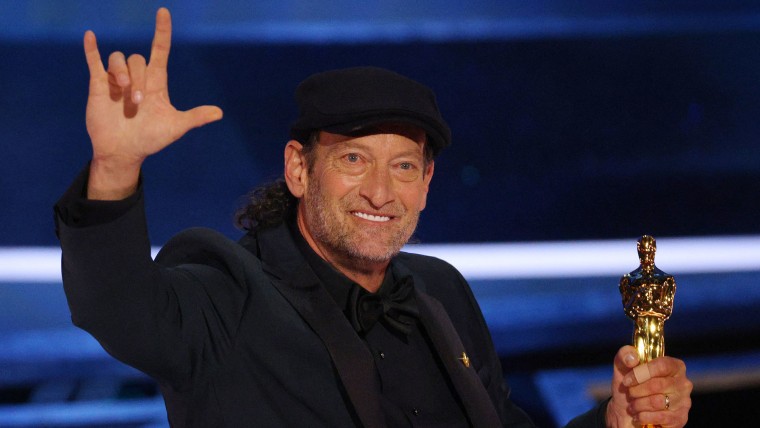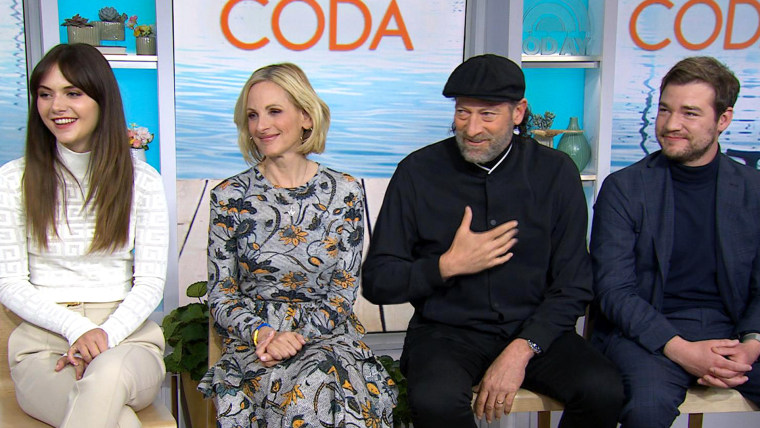‘CODA’ Oscars win should usher in a new era of inclusion
“CODA,” a film that showcased deaf actors portraying deaf people, was the astonishing winner of the Oscar for finest photograph Sunday night. The rave reviews and the film’s other awards — which include Oscars for Troy Kotsur for greatest supporting actor and Sian Heder for greatest adapted screenplay — ended up currently incredibly encouraging, but “CODA” getting home the major prize on Hollywood’s biggest stage should to give the industry more incentive to make flicks by, for, about and with individuals with disabilities.
The Academy of Movement Photograph Arts and Sciences has a lengthy historical past of worthwhile lousy portrayals of incapacity.
“CODA” chronicles the Rossis, a spouse and children in Massachusetts in which the spouse, husband and son are all deaf but the daughter, Ruby, is the only listening to member, who learns she has a talent for singing. That prospects to her performing to apply to Berklee College or university of Tunes.
The Academy of Movement Image Arts and Sciences has a long heritage of rewarding weak portrayals of incapacity. It has rewarded Dustin Hoffman, Eddie Redmayne, Daniel Day-Lewis and Tom Hanks, abled-bodied actors who all, all at a single issue or a different, have been rewarded for “cripping up,” that is, portraying disabled people. In recognition of Hollywood’s disrespect of disabled people, Jim Sheridan, who directed the movie “My Remaining Foot,” for which Day-Lewis attained his Oscar, has reported he would solid a person with a disability if the movie ended up created now.
I have written in this place right before about the will need for Hollywood to far better portray people with disabilities. Provided the success of the 2020 documentary “Crip Camp” and the backlash very last yr to “Music,” Sia’s reductive and unsafe portrayal of autism, there appears to be to be far more of an appetite for this sort of movies. But the entertainment marketplace has been sluggish to make flicks that correctly and wholly portray men and women with disabilities.
To be distinct, “CODA” isn’t excellent, and the Deaf local community has its critiques. Jeanna Beacom has claimed “CODA” doesn’t correctly portray deaf grownup activities. An additional repeated criticism is that, between the people, there are no other interpreters besides daughter Ruby, the sole hearing member in a family when interpreters would be legally demanded by the People with Disabilities Act for the Rossis’ fishing boat, as well as for a court docket hearing. For what it’s really worth, I feel the absence of additional interpreters could have been employed to demonstrate how frequently persons with disabilities do not get the products and services to which they’re entitled, and that could have been contrasted with the truth that the family members functions in an overregulated fishing market that doesn’t supply them the legal protections they want to thrive. Each individual individual with a disability has dealt with this indignity and is aware that it will make do the job more durable.
The Deaf local community has every single correct to voice its considerations, specially due to the fact “CODA” is one of the initial key movies about a deaf spouse and children. Personally — as an autistic hearing particular person — I cringed at the final decision to have the deaf father, performed by Kotsur, verbally inform his daughter “Go” as she heads off to university since it indicates spoken text are much more valid than signed words. In the back of my mind, I fearful that the academy factored that scene into its judgment when it voted to give him the award, even as he gave a loving signed tribute to the disability group in his acceptance speech.
The only way to get superior films with folks with disabilities is for the field to preserve producing them.
We may possibly count on “CODA” to be an imperfect portrayal of the disabled working experience, primarily considering the fact that the enjoyment field has not carried out numerous identical flicks. The only way to get better flicks with individuals with disabilities is for the marketplace to maintain creating them right up until their portrayals grow to be more normal. As for “CODA,” I individually recognize the film’s portrayal of individuals with disabilities owning fulfilling adore and intercourse lives since for significantly much too extended, disabled figures have been portrayed as eunuchs.
As we celebrate “CODA” successful best photograph Oscar, we need to have to recall that everything had to go ideal for the film to get. Apple Tv set hosted it on its streaming company, which gave it the suitable form of backing, and The Wall Avenue Journal estimated that Apple expended about $10 million campaigning for it to get Oscars. Most disabled creators really do not have this sort of great fortune.
“CODA” also experienced a significant star in Marlee Matlin, the only openly disabled actress to have received an Oscar, and not only was her casting absolutely sure to catch the attention of viewers, but Matlin also employed her leverage and threatened to pull out of the motion picture if other deaf actors were not solid. “Deaf is not a costume,” she reported. She’s right. No disability is. A solid of deaf actors gave “CODA” a realism listening to actors could not probably have replicated, which, in turn, made for an even improved film.
But of training course, the movie enterprise is just that, a company. It needs the suitable sort of inspiration, which is to say awards, which deliver viewers, which bring pounds. Now, the organization will see that disabled tales can be just as profitable as other types and gain just as several accolades. The dilemma is irrespective of whether the wins of “CODA,” as IndieWire’s Kristin Lopez said, implies extra talented actors, like Kotsur, will be supplied exterior individuals exclusively produced for people today with disabilities.
Significantly much too often, individuals use ableist cliches this sort of as “falling on deaf ears” or “turning a blind eye.” But that is inaccurate and offensive deaf persons aren’t choosing not to listen to neither are blind people deciding on not to see.
But for considerably too extended, Hollywood has deliberately chosen to act as if disabled folks really do not exist as figures, creators, viewers or actors. The wins for “CODA” are big, but it won’t indicate considerably if Hollywood goes again to its previous, oblivious approaches.


